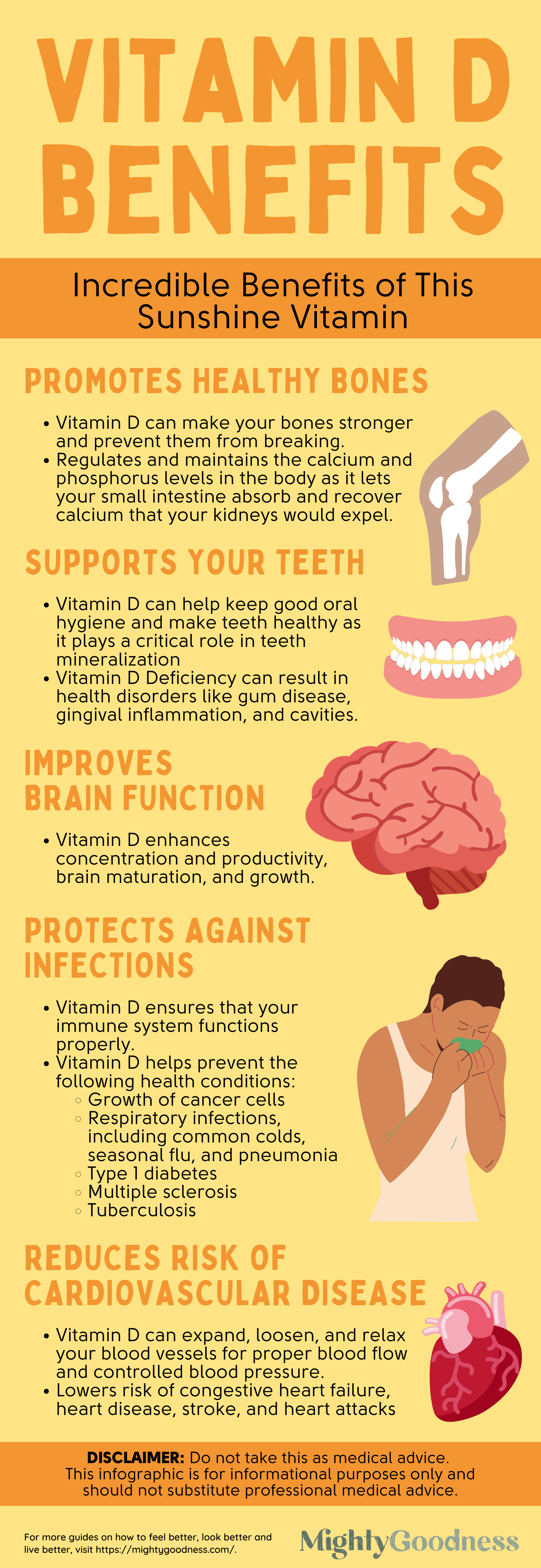5 Incredible Vitamin D Benefits | The Health Benefits of this Sunshine Vitamin
Did you know that Vitamin D is not a vitamin at all? Instead, it's a hormone our bodies produce when we get direct sunlight. And it's not just beneficial for your skin – Vitamin D has incredible benefits for your overall health!
This blog post will discuss some of the essential Vitamin D benefits and how you can make sure you're getting enough of this crucial nutrient.
RELATED: Top 9 Best Vitamins for Men Over 40
5 Vitamin D Benefits | The Incredible Health Benefits of This Sunshine Vitamin
Click here to jump to the infographic

Surprisingly, vitamin D isn't regarded as a vitamin because vitamins are nutrients that your body cannot produce. The great news is: that your body system can create vitamin D as long as you get exposed to the sun.
Vitamin D
Vitamin D is a prohormone or precursor molecule – this is where a hormone is derived. You can find vitamin D receptors in your tissues and organs and keep them in your system for an extended period.
Vitamin D is fat-soluble, which means your body only absorbs it when eating oily and fatty foods. It's also associated with different activities of your circulatory, digestive, immune, and nervous systems.
Vitamin D Deficiency
However, even though your body makes vitamin D, a deficiency may still occur. When you have Vitamin D Deficiency, you'll often get sick and tired and experience bone pain and deformities.
If left untreated, this deficiency may lead to complications such as neurological diseases and certain cancers.
Vitamin D Sources

When you soak up the sun, your body manufactures vitamin D naturally in your skin.
First, the ultraviolet rays interact with cholesterol in your body to create vitamin D components. Afterward, your body converts them into a hormone.
To get sufficient sunlight, go out at least three times a week, for 15-20 minutes per day. Just peeking through the window may not be enough.
Those who are dark-skinned may need more prolonged sun exposure, as the melanin functions like a shade, decreasing vitamin D production.
However, it's essential that you talk to your dermatologist about going outdoors since too much sun exposure may increase your risk of skin aging and cancer.
Vitamin D Foods
Apart from sunlight, you may also need to acquire vitamin D through your meals. Here are the few food sources considered rich in this nutrient:
- Orange juice
- Fatty fish, including tuna, salmon, mackerel, and sardines
- Eggs
- Beef liver
- Fortified milk
- Cheese
- Mushrooms
- Fortified cereals
- Peanut butter
- Avocados
- Chicken
- Cod liver oil
- Oysters
You may also check food labels to see if they're fortified with vitamin D.
Vitamin D Supplement
Additionally, you may need to take supplements to ensure that you get an ample amount of this vitamin.
Those who may need extra vitamin D are:
- People with Crohn's disease, liver diseases, and cystic fibrosis
- Individuals who are obese
- Older adults
- People who had gastric bypass surgery
- Breastfed infants
- People who reside in areas where there's limited sunlight
- Individuals who stay much of the time indoors
- Those who have difficulty absorbing dietary fat
RELATED: 12 Superfoods To Boost A Healthy Diet
5 Essential Vitamin D Benefits
1. Promotes Healthy Bones

Your bones are vital to your body, making you stand up and move around. You can make them stronger and prevent them from breaking with the help of vitamin D.
Vitamin D regulates and maintains the calcium and phosphorus levels in your body. So it would be best if you had this nutrient to let your small intestine absorb and recover calcium that your kidneys would expel.
Vitamin D deficiency can result in muscular weakness and bone-related ailments, including softening of bones, poor bone density, bone pain, and osteoporosis. In addition, you may experience back pain, stooped posture, fractures, and declining height.
Unfortunately, these bone diseases don't only affect older adults. They also have an impact on children in the form of rickets. These include pain in the legs, spine, and pelvis.
2. Supports Your Teeth

You can impress your dentist on your next visit with vitamin D.
In addition to brushing and flossing, vitamin D can help keep good oral hygiene and make your teeth healthy, as vitamin D plays a critical role in the mineralization of your teeth.
A study shows that a lack of vitamin D can result in oral health disorders, such as gum disease, gingival inflammation, and cavities.
3. Improves Brain Function

As you age, your brain also gets older. However, you may maintain the youthfulness and alertness of your brain with vitamin D.
Vitamin D affects your mental health as much as your physical health. It enhances your concentration and productivity and brain maturation and growth.
Newer studies have released a possible connection between brain health and vitamin D. For instance, a study reported by Medical News Today shows a relationship between developing schizophrenia and lack of vitamin D.
If you have Vitamin D Deficiency, you may also be at a higher risk of cognitive decline, including dementia and Alzheimer's disease.
In addition, those who experienced and survived a sudden cardiac arrest have a lower chance of recovering their memory functions if they have vitamin D deficiency.
4. Protects Against Infections

Vitamin D acts as a d-fence for your health, ensuring that your immune system functions properly.
Additionally, it helps prevent the following conditions:
- Growth of cancer cells
- Respiratory infections, including common colds, seasonal flu, and pneumonia
- Type 1 diabetes
- Multiple sclerosis
- Tuberculosis
Vitamin D deficiency may also be associated with the development of autoimmune diseases – this is a condition wherein your immune system has an abnormal response and can't differentiate between healthy cells and foreign cells. As a result, the body's natural defense system attacks and destroys its organs and tissues by mistake.
5. Reduces Risk of Cardiovascular Disease

Your heart is one of the most vital organs in your body. It pumps blood, and your blood vessels transport this blood throughout your body.
However, an unhealthy lifestyle can cause your blood vessels to narrow – this is where vitamin D enters.
Like your skeletal muscle, your heart also has vitamin D receptors. Vitamin D can expand, loosen, and relax your blood vessels for proper blood flow and controlled blood pressure – this lessens your risk of congestive heart failure, heart disease, stroke, and heart attacks.
Here's an infographic guide that you can use. Feel free to download, save and share it with your loved ones:

Low Vitamin D Symptoms
Check out this video by BRIGHT SIDE to learn more about Vitamin D and find out about low vitamin D Symptoms:
Vitamin D is a crucial nutrient that your system needs to perform numerous essential functions. So ensure that you meet its daily recommended levels to maximize these vitamin D benefits.
Do you think that vitamin D is necessary for overall health? Do you get enough vitamin D? Do you know of any other vitamin D benefits? Please share with us in the comments section below.
You Might Also Like:
Trending
Comfort Food Cravings: A Healthier Way to Balance Winter Eating
Mindful Black Friday Shopping: Save Big While Staying Zen!
Get Updates
SIGN UP FOR OUR NEWSLETTER TODAY

How To Build Your Endurance And Stamina

How to Last Longer in Bed and Enjoy Better Sex!

Related

How To Build Your Endurance And Stamina

